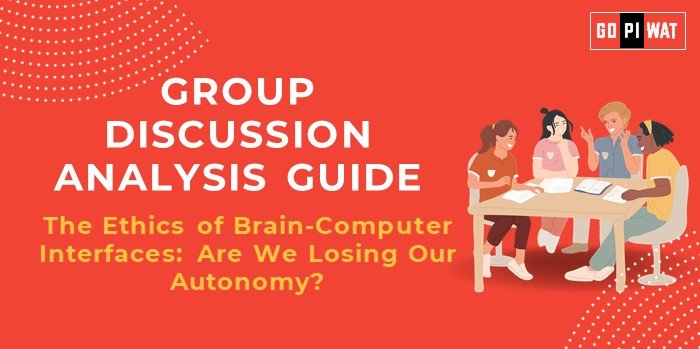📋 Group Discussion Analysis Guide: The Ethics of Brain-Computer Interfaces: Are We Losing Our Autonomy?
🌐 Introduction to the Topic
- Opening Context: Brain-computer interfaces (BCIs) are heralded as groundbreaking in merging human cognition with artificial intelligence, yet they pose deep ethical questions about autonomy and control.
- Topic Background: BCIs have evolved from aiding individuals with disabilities to potential enhancements in cognitive and physical abilities. However, this rapid advancement raises concerns about individual freedom, privacy, and societal norms.
📊 Quick Facts and Key Statistics
- 📈 Global BCI Market Size: $1.74 billion in 2021, projected to grow at 15% CAGR by 2030, signifying rapid adoption.
- 🧠 NeuroTech Usage: Over 60% of applications currently focus on healthcare, indicating ethical stakes in medical autonomy.
- 🔬 Cognitive Enhancement: Trials by Neuralink and other companies are exploring human augmentation, sparking debates on equitable access.
- 🔒 Privacy Risks: 78% of surveyed users expressed concerns over mind-reading capabilities of BCIs.
👥 Stakeholders and Their Roles
- 💻 Tech Corporations: Innovators and developers of BCI technology.
- 🏛️ Governments: Regulators and policymakers addressing ethical boundaries.
- 🏥 Medical Institutions: Implementers of therapeutic BCIs, balancing care and ethics.
- 🙋♂️ Citizens: End-users and societal actors affected by policy decisions.
🏆 Achievements and Challenges
✨ Achievements
- Medical Breakthroughs: Restoring mobility in paralyzed individuals through BCIs.
- Cognitive Advancements: Improved focus and efficiency in human-computer interaction.
- Economic Impact: Growing NeuroTech industry fostering innovation and jobs.
- Global Participation: Initiatives like the EU’s Human Brain Project enhancing cross-border collaboration.
⚠️ Challenges
- Ethical Boundaries: Distinction between enhancement and essential healthcare.
- Privacy Concerns: Risks of neuro-data breaches.
- Accessibility: High costs creating disparities.
- Global Comparison: Countries like Japan lead in ethical AI integration, offering lessons in governance.
📚 Structured Arguments for Discussion
- 💪 Supporting Stance: “BCIs represent the future of healthcare, enabling unparalleled autonomy for disabled individuals.”
- ❌ Opposing Stance: “The unchecked development of BCIs risks creating a dystopia where autonomy is compromised by surveillance.”
- ⚖️ Balanced Perspective: “While BCIs offer medical miracles, their success hinges on ethical oversight and equitable access.”
💡 Effective Discussion Approaches
- 📊 Opening Approaches:
- Start with a statistic: “With the BCI market poised to grow 15% annually, the implications for autonomy are vast.”
- Pose a question: “Are we trading autonomy for convenience with brain-computer interfaces?”
- 🎯 Counter-Argument Handling:
- Example: “While privacy concerns are valid, secure encryption could mitigate most risks.”
🔍 Strategic Analysis of Strengths and Weaknesses
- ✅ Strengths: Medical applications restoring autonomy, economic growth in NeuroTech.
- ❌ Weaknesses: Privacy vulnerabilities, limited regulation.
- 🚀 Opportunities: Cross-industry innovation, public-private collaboration in ethics.
- ⚠️ Threats: Ethical controversies stalling progress, over-commercialization harming societal trust.
🎓 Connecting with B-School Applications
- 📌 Real-World Applications: Discuss the intersection of technology and ethics in operations management or strategy courses.
- ❓ Sample Interview Questions:
- “How would you address ethical concerns in a BCI startup?”
- “What role can BCIs play in improving corporate productivity?”
- 📘 Insights for Students:
- Explore NeuroTech ventures for internships or projects.
- Analyze case studies on ethical dilemmas in AI.


